#Character Agency
Explore tagged Tumblr posts
Text
Character Agency
Your characters should have agency. That means they have the power to influence what’s happening around them. We talked a bit about agency last time, revolving around how many female characters get agency stripped away from them. But overall, agency is important for any character to make them active participants in their own stories and feel necessary to the plot.
So here’s how you enable your characters agency:
1. They make active decisions
Okay this is the obvious one in theory, but still manages to sneak by in stories undetected. An active character with agency makes things happen through their decisions, instead of just their reactions. Take these two examples of a scene plan:
John is walking home when he is caught by a sudden storm. Looking to hide from the rain, he ducks under the cover of a bus shelter. Inside is Mya, and they strike up a conversation about their shared sucky situation.
Vs.
John is walking home when he is caught by a sudden storm. Luckily he brought an umbrella in his bag, and draws it out. Then, he sees Mya getting drenched by the rain ahead of him. He jogs to her, offering to share the umbrella. They strike up a conversation.
In the second example John isn’t just reacting but making a choice that’s changed something in the world. He may just happen to run into Mya, but it was his decision to run up to her, to offer her his umbrella. This action is a great indicator of his personality—he’s kind, trusting, and thoughtful even towards strangers.
That’s the most important part. A character who just reacts to everything doesn’t show off any personality, whereas action lets you demonstrate who your character is at their core (especially in difficult situations that call for difficult decisions).
2. Their actions have consequences
Similarly, the decisions your active character makes aren’t really decisions if they don’t impact any part of their world. For good or for bad, every decision your character makes should have a consequence. This could be shown through their relationships with others, their environment, or even their own mental, physical, or spiritual state.
If we’re going from the example above, John sharing his umbrella with Mya maybe starts their friendship, but her jealous, toxic boyfriend sees them through his window, making her and now his life difficult.
It’s a decision that has multiple consequences throughout his life—a new friendship, and also a new enemy. And Mya is also facing consequences—from her decision to walk with him, and his decision to offer her the umbrella.
Make sense? How do you ensure your character has agency?
#writing#creative writing#writers#writing community#screenwriting#writing inspiration#books#filmmaking#film#writing advice#character agency#main characters#side characters#active characters#active vs passive characters
576 notes
·
View notes
Text
that last post I made about agency with Exocolonist npcs is huge because one of the things I most love about Exocolonist is what it does with Sol's agency.
You can shape the entire direction of the colony. It's Sol's actions, your decisions as a player, that decide whether the colony ends up in a forever war with the ecosystem for Sol's lifetime or not. You can cause, or prevent, an ecological collapse. And that's just the ending. Sol's foraging can be the difference that ends a famine. Sol can personally save the life of multiple higher-ups in the colony's government, including the governor herself.
But you're doing that from a position where you're a child who the adults, for the most part, won't listen to. You can nudge, you can find things outside the colony's walls, but you can't just tell people to do things.
The game I always like to compare it to is Mass Effect: Andromeda, although there are plenty of others like it, where you as the player are presented with a nascent society (the Citadel species' first colonies in another galaxy, which mirrors Exocolonist's humanity's first exoplanet colony) and offered the chance to shape it, and to do that you're given a character placed in a high-agency position. Andromeda makes you the Pathfinder, which is something that can be objectively determined so their normal policies can't oust you as Pathfinder and put someone previously higher up the chain of command (like Cora) in charge instead, and gives the Pathfinder arbitrary authority to, like, override the normal sequence in which people are brought out of cryo, or set the objectives of their new outposts.
Exocolonist asks the question "do you need a character with those powers to tell stories like that," and answers it very cleverly. It's a story about agency.
36 notes
·
View notes
Text
I've been thinking about what the Bad Batch means to me these past few weeks and things just don't quite sit right. When I started watching the Clone Wars, it felt like a lot of love and care had been poured into the project. The clones had unique personalities built from the ground up, with even minor characters getting quirks. Hevy only appeared in two episodes, yet is so loved. Hardcase is missed despite only really appearing in one arc because of expert character crafting and real, actual effort with the writing.
The point of the Clone War was that the clones were individuals, they had agency and they could have an impact on their lives and others. Referred to as 'property', with no representation or rights, they are slave soldiers in function, who are biologically identical although at times with slight variation, but their personalities and motivations matter and have weight. This is why Fives nearly ruins Palpatine's plans. This is why Rex is able to resist the inhibitor chip in Order 66 and help save Ahsoka.
This is why I'm not sure I can forgive the Bad Batch.
Spitting on Grandpa
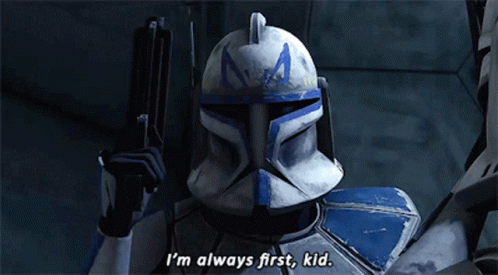
When the Bad Batch started, I was initially quite excited because it was advertised as a sequel to the Clone Wars. The first episode opens up with the title 'The Clone Wars' fading into the Bad Batch, but the show is anything but because the 'regs', as normal clones have been dubbed, don't matter now. Instead, the only characters with agency are a special group of clones who mostly don't look like the clones based on Jango Fett (Temuera Morrison) or even scientifically fit the basic definition of what a 'clone' is.
How is this not meant to be insulting for TCW and the Clone Fandom? I watch normal clones like Commander Wilco get shot in the face. I watch Mayday choke and die for Crosshair's development. I watch Rex play second fiddle to the Bad Batch on screen, the man and leader who used to always say "I'm always first, kid" and take the reins. I watch Cody appear for an episode only to not appear again this season and have no impact on the narrative other than Crosshair's development. Can 'regs' no longer change the world? Do the 'boring', 'regular' slave soldiers have no impact anymore?
Echo: "The fate of all the clones is now sealed because of us."
When it comes to normal clones impacting the narrative, the closest we get is Rex's resistance network, which features actual clones actually doing something. Yet apparently an episode about the Bad Batch discovering an island paradise world and battling a tsunami deserves more screen time than seeing how the 'regs' set that one up. Even this plot point is less about finally saving Howzer and normal clones like him, and more about Echo not being with the Bad Batch and further setting up the plot regarding Tech and Crosshair. The normal clones remain non-entities outside of the Bad Batch's development, they have no agency beyond this.
This is why we see stock reg clone characters bully the Bad Batch in the Season 1 opening, because despite them all being slaves under the thumb of fascism and the fact normal clones treated Ninety-Nine (the beloved hunchback clone from TCW Season 3) fine, it's the Bad Batch's plight that only matters now, their persecuted perspective on being special and better than the regs, regs that are now treated as old news, an afterthought. The world feels small, and inexcusably less richer than it was.

Essentially, we're no longer allowed to see what the reg clones motivations are, why there are reg clones that actually, canonically, dislike the Bad Batch as opposed to Ninety-Nine. People like to speculate, but on screen we are not shown or told in TBB. We're also not shown why all the named clones from Howzer, Mayday, Fireball, Gregor and Nemec to Cut, Cody and Rex never had issues with the differences other than they're the good regs I guess. Hell, even Cody and Mayday's remaining squad say nothing of Crosshair's mutations, not even one catty comment.
Conclusion
So, what does this mean? The Bad Batch steals the clones' agency and makes it their own. They wear the clone identity, but refuse to help normal 'reg slave' clones that look like actual clones in favour of focusing on themselves and their 'more important' personal problems. The Bad Batch are special not because of who they are or that they've worked hard, but because they look different from other clones, because they're just more capable and have special abilities. It's not who you are that counts, it's what you are.
And, now, I even see fans doing what TCW told us not to, disregarding normal clones, 'explaining' why the Bad Batch are fine to leave the reg clones to die because they called them "The Sad Batch" one time. Somehow the Bad Batch undoes all of TCW's work, stripping the clones of their agency and making them into just victims sleepwalking into extinction as we wait for the Bad Batch to consider trying to actively save them.
Echo: "The fate of all the clones is now sealed because of us."
And, then the rest of TBB go cave exploring and holidaying on Pabu. This series might as well be about natborns.
#the clone wars#captain rex#the clones#clone rights#star wars tcw#clone troopers#character writing#character agency#tbb echo#star wars#tbb season 2#tbb critical#anti tbb
250 notes
·
View notes
Text
Writing Problem: The Conflict Is Inconsequential, Flash-in-the-Pan
Problem: The Conflict Is Inconsequential, Flash-in-the-Pan
Solution: Many authors struggle to contrive meaningful conflict such that it either shapes or speaks critically to the trajectory of the characters it touches. Conflict is not a consequence or a corollary of scheme or impulse; conflict should develop as the story develops and grow as the character dynamics grow.
Explore character through conflict by reinforcing their goals and their perceptions (of reality), as well as the plausibility of maintaining either. Use conflict to reveal blind spots, biases, or fears. Conflict doesn't narrow the possibility of who characters are, or what the story might convey; conflict opens characters (or readers) to new methodologies, new stakes, and possibly new goals, as a result of enduring or overcoming the fracas in question. Conflict adds depth.
Writing Resources:
Conflict Thesaurus (One Stop for Writers)
Need Compelling Conflict? Choose A Variety of Kinds (Writer's Helping Writers)
How to Draw Readers in Through a Character's Choices (Writers Helping Writers)
Exactly How to Create and Control Tone (September C. Fawkes; ahbwrites)
Are Your Conflicts Significant? (September C. Fawkes)
Tension vs. Conflict (Hint: They Aren't the Same Thing) (September C. Fawkes)
How to Write a Dystopian Story: Our Gide (Jericho Writers)
Plot Conflict: Striking True Adversity in Stories (Now Novel)
How to Use Central Conflict and Drama to Drive Your Novel (Now Novel)
❯ ❯ Adapted from the writing masterpost series: 19 Things That Are Wrong With Your Novel (and How to Fix Them)
#writeblr#writing tips#writing advice#writing conflict#fiction writing#writing problems#novel writing#conflict#writeprob#conflict thesaurus#reinforcing goals#character agency#character choice#writing drama#how to create and control tone#writing tone#adversity in stories
23 notes
·
View notes
Text
youtube
I have some reservations here because show! Alicent is in fact given some agency, only that it withers into nothingness much later in the season to serve the Rhaenyra Better Ruler Best Friend narrative.
I do agree A LOT, however, with the statement that while later seasons of Game of Thrones suffers from what the characters DO, House of the Dragon has underperformed because of what the characters DON'T do (e.g the dreadful Green Council episode and Rhaenyra wavering in the finale).
22 notes
·
View notes
Text
Let's talk about character agency.
I've been in a few discussions recently in roleplaying circles that discuss how much agency to give players and their characters, and the advantages and limits of railroading.
Often, people criticise GMs who direct their players, who lead them in a specific direction, who push them towards certain destinations and outcomes. They proclaim the importance of player "agency", by which they mean the freedom of the player to do what they want. In a collaborative storytelling experience, constraining some of the participants is by definition a bad thing. It sounds like a strawman, and it isn't, this is just me accumulating the arguments and thoughts of a large number of people I've had the pleasure of talking with.
I obviously disagree (or else this post wouldn't exist). I feel like people misunderstand the meaning of agency. Maybe it's just a me thing, but I feel like there is a solid difference between agency and freedom.
If a character or player has freedom, they can do what they like, how they like. If a character or player has agency, they are the agent of their own situation. What I mean is that to give a player agency isn't necessarily to allow the players to do what they want, that's something the GM can impose, but to allow them to do it how they want.
Escape rooms give an interesting framework of thought for this. You dump players in a room. They can do any action they like, in the limits of the room. But their objective is clear and fixed, they can't just choose to do something other than escape (unless they refuse to play the game, but that's irrelevant here). However it's up to them to find a way to act that can advance their objective. They don't have freedom, but they do have agency.
Another example I'd give is from video games, specifically Halo Reach. The ending of the story is a foregone conclusion. There's nothing you can do to change that, it's defined from the moment you click the "start campaign" button. In terms of "freedom", there is no better way to show a lack thereof than by showing proof of the player character's future death. But throughout the story, you as a player have the opportunity to be an actor in the central conflict of the story, in the limited way in which a linear FPS lets you.
TL;DR: freedom is overrated. Agency is the key. And agency is the position of being an actor in your story, even if you don't have a choice.
I dunno, maybe this is all pretty obvious to people. But it's something I wanted to talk about, and I haven't posted anything original for quite some time.
8 notes
·
View notes
Text
This by far one of the WORST takes from @hamishsteele:
I am paraphrasing my boyfriend here a lot but the thing with lara croft is I find her a more compelling character as someone who "only hunts for sport" rather than all this damn father trauma stuff. I don't think that stuff makes her more layered, it actually removes her agency.
I was and remain pretty disappointed to see it. I responded on Twitter about this, saying that I disagree and adding "she clearly DOES have agency and is haunted by her past. I don't see an issue with that." Another good post that discusses the issue with perspectives like Hamish is here:
2 notes
·
View notes
Text
The WIP project - agency

Hello writerly friends!
I must admit, things are not going so well with my goal of 40k in 50 days. So not well, actually, that I already adjusted the goal to 20k in 50 days. Because that's what you have to do when things get off track. It's no use to try to force a system to work if reality is working against you.
This is me taking control of my plot. I have agency in my life, I decide how I manage my life and how I write and how I set my goals.
Speaking of agency (behold the segue (it's not segway? I could have sworn...)), I came across a post by Tiffany Yates Martin on Jane Friedman's blog about character agency. https://janefriedman.com/who-makes-it-happen-giving-your-characters-agency/
Maybe it's just me, but one problem I often have is that my characters just sort of run along with the plot, getting thrown here and there. The story happens to them, instead of them happening to the story.
According to Martin's post, these are some common traps that make characters too passive:
The witness: The protagonist is present for the action of the story, but primarily as an observer or reporter, rather than a key driver of the plot. The bystander: The plot happens adjacent to the main character; he’s “in the room where it happens,” but not intrinsic to making it happen. The recipient: Another character in the story effects the action and drives the plot, handing the spoils—essential information, progress toward a goal, etc.—to the ostensible protagonist, who didn’t directly do anything to achieve them. The victim: The character is woefully put-upon in her journey toward self-actualization, but we never see her taking the reins to act for her own salvation; she just weathers the storm.
Oh yeah, that sounds familiar. I have one story where the main character starts out very much as the bystander. It's part of her growth process to change that, but I should probably hurry that along before my readers get bored with her.
Look at your characters, are they active? Do they drive the plot? Does the plot develop with their decisions?
As with all advice, this is not an all-or-nothing situation. I think a character can also be passive for a while, depending on their situation, but if they never make decisions, the story might get boring to read.
How do your characters fare? Are they active or more passive?
---
@quilleth, @theoriginalladya, @kmlaney, @coffeewritesfiction, @mareebrittenford, @lilliebellfanfics, @keyboardandquill, @fontainebleau22, @kinetic-elaboration, @wildswrites, @rhikasa, @inkvulture, @heroofshield, @bad-at-names-and-faces, @sabels-small-sphere, @annaofthenorthernlights, @sarahawke
17 notes
·
View notes
Text
I salute this. It's a pleasure to find others who are aware of just how colourful, varied and nuanced the world has always been. Humans all over have agency and have been interacting and migrating since the dawn of our advent. Do people think the Silk Road was manned by drones?
If a writer's world is divided into neat, separate and impenetrable squares, they're doing something wrong.
It wouldn’t be historically accurate for my story to include BIPOC!
This is an argument often made about European-style fantasy media like Game of Thrones, Lord of the Rings, and Disney’s Frozen. Audiences, often white, assume that due to the majority-white setting, adding any visible number of BIPOC to the story would be unrealistic.
What these critics fail to realize is that BIPOC do in fact live, and have lived, in these settings, and records of BIPOC presence in places assumed to be majority-white have been buried, written out, or not taught due to white supremacist and/or colonial bias in the field of history. There are historical European settings that were far more diverse than is often portrayed. Consider:
The Moorish Empire exerted an extensive influence over life and culture in Southern Europe from Spain from 711 to 1492
The Ottomans were heavily involved in European affairs up until the treaty of Karlowitz in 1699, but still considered a part of Europe even through the 19th century
The sheer size of the Roman Empire ensured the continued movement of people from various backgrounds within the Mediterranean well until the end of the Byzantine Empire.
“Historical accuracy” should not be used as an excuse for media to be exclusively white in its casting. While there are places which are or were predominantly white, there will always be factors like global trade and immigration that bring multiculturalism to their doors.
And even if the presence of a certain demographic is unrealistic for a certain setting? Consider that we’ve accepted far worse inaccuracies in historical fiction in the name of artistic license. Consider that our understanding of human history is, and will always be, incomplete.
Further Reading:
Historically Diverse London, “Historical Accuracy,” and Creator Accountability
Making a Black Pride and Prejudice Resonate
---
This Q&A is an excerpt from our General FAQ for Newcomers, which can be found in our new Masterpost of rules and FAQs. If you're new to Writing With Color and/or want more writing resources, check it out!
-Writing With Color
#black history#diversity#it isn't new#historical accuracy#british history#ottoman empire#worldbuilding#it needs to be organic#character agency#if your world is full of people remember people can be unpredictable#poc characters
3K notes
·
View notes
Text
Writing Diverse Characters: Inclusivity in Fiction
Inclusivity in fiction isn’t just a trend—it’s a necessary evolution of storytelling that reflects the rich and varied experiences of humanity. Writing diverse characters allows authors to craft stories that resonate with a broader audience, challenge stereotypes, and promote empathy. However, doing this effectively requires intention, research, and a genuine commitment to authenticity. This…

View On WordPress
#authentic representation#character agency#Character Development#cultural sensitivity in writing#Diverse Storytelling#inclusive fiction#inclusivity in fiction#intersectionality in writing#overcoming stereotypes in writing#Writing Advice#writing authentic characters#writing diverse characters#writing for all audiences#Writing Tips
0 notes
Text
Do well by your female characters
Back in film school you wouldn't believe the amount of scripts I read from my (mostly male) classmates that featured the same character; a kind, helpful woman reflective of the male protagonist who showed up when he needed her to offer warm words and support, allowing him to overcome obstacles and go for what he needs.
I hope she doesn’t sound familiar to you.
One of them was a coworker, another a train station attendant, another the best friend who lived next door—it didn’t matter, they were all the same character, uninvolved in their own lives, created to help a man get to his goal. Let’s be wary of this trope, and stop robbing our female characters of their own agency. We can do this in a few ways:
1. They aren’t convenient
One confusing fault of the female characters I read in my peers’ scripts was that she was always around right where the protagonist needed her to be. It didn’t matter if he was having a crisis in the alleyway, or by the museum, or in his own house, she’d show up like she’d been summoned.
She needed a place to be—a life outside of him. A job, school, hobbies. Sometimes when he needs her—she shouldn’t be there.
2. They have an actual personality
While being warm, kind, supportive, and empathetic are all admirable traits people do have, I’ve never met a real person where that’s all they were. Like building any character, she needs flaws, interests, something to her that isn’t just for other people’s benefit. Consider what traits she has that aren’t just ways she serves others.
Allow her something just for her. Something selfish.
3. They have and work towards a goal
Related to her not being convenient—she’s got her own thing going on. Like any other character, she has goals and objectives, motivations, something to work towards. As much as she supports the protagonist, she also takes from him to fulfill her own goal.
Give her wins, disappointments, a little something going on. Something to gain from her interactions with him.
What else bothers you about common female character tropes? Or what did I miss?
#writing#creative writing#writers#writing community#screenwriting#writing inspiration#books#filmmaking#film#writing advice#female characters#writing female characters#mary sue trope#character agency
248 notes
·
View notes
Text

Glad Fyodor's finally dead, everyone's alive and we can go back to solving cases and flirting fighting with the PM :D
#bungou stray dogs#bsd#armed detective agency#I mean I had this piece started since the Kunikida... incident#so might as well finish it and hope for the best#fanart#digital art#all character tags incoming!!#mushitaro oguri#edgar allan poe#aya koda#bsd sigma#sigma#dazai osamu#ranpo edogawa#yosano akiko#kunikida doppo#atsushi nakajima#lucy maud montgomery#izumi kyouka#kenji miyazawa#tanizaki junichirou#naomi tanizaki#kirako haruno#fukuzawa is okay. he's just retired with his cats
5K notes
·
View notes
Text
Writing Wednesday: Half-Life of a Soul Status Update
Back in March of this year, I hit such a horrible roadblock. I was still writing but I stopped because I knew something was wrong and I could NOT figure out what. If I kept writing, I’d only make more work for myself later. I somehow knew this roadblock would end up meaning some big rewrites. Continue reading Untitled

View On WordPress
#agency#Caleb#character agency#editing#Half-Life#Half-Life of a Soul#Lauren#no spoilers#rewrite#writers block#writers life#writerslife#writing
1 note
·
View note
Text
"Well, I'm aces with people!" said the boy who was just killed by his friends
"I'm not good with other people..." said the boy who escaped dehumanizing 70+ years of Hell just to comfort a stranger through death
#edwin payne#charles rowland#payneland#the characters you are#dbda#dead boy detective agency#dead boy detectives#text post#the case of the very long stairway
3K notes
·
View notes
Text
hey uh not for nothing but uhhHHHH
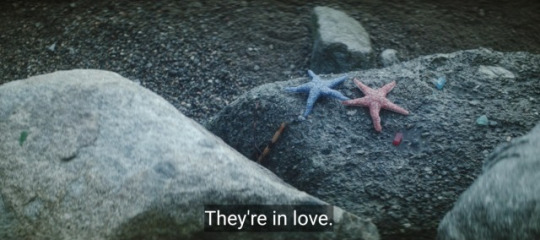
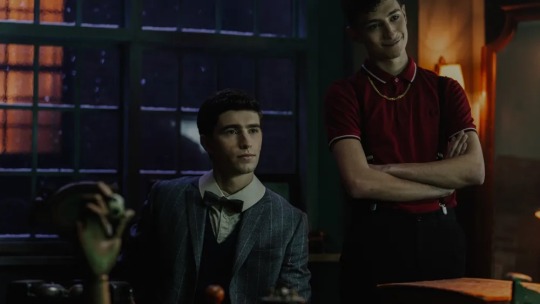
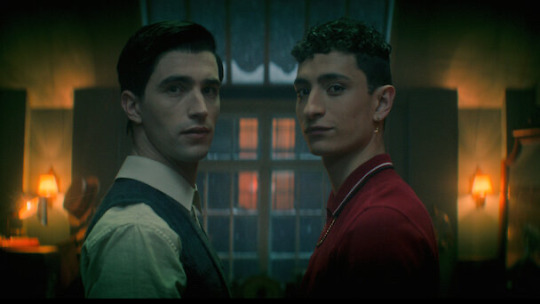
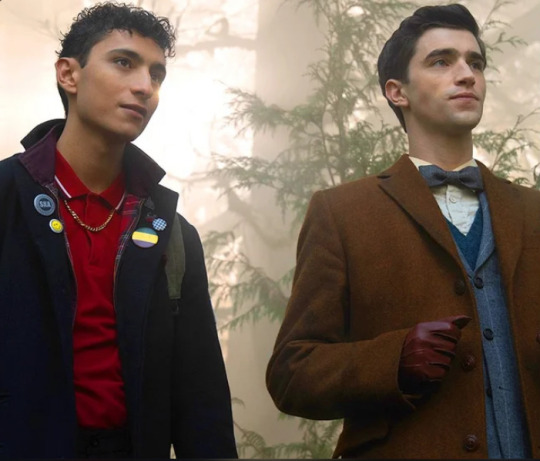
blue... and red ? alrighty
#*goes a little crazy*#has this been mentioned yet if so my bad sorry 👉🏻👈🏻#tb to my 31000 note post about red and blue characters👀#big fan of canon bi charles in the comics it better come up in the show next 👁️👁️#i stg if yall make this about klance-#dead boy detectives#dbda#dead boy detective agency#charles rowland#edwin payne#charwin#payneland#george rexstrew#jayden revri#chedwin#painland#paynland#(being delusional) and the red rock is niko and the blue is crystal and the green is monty and the stick is cat king and-
5K notes
·
View notes
Text








thought i’d share this goofy little series i did a few weeks ago of if the characters from Dead Boy Detectives were 2D animated 🤣🤣
(they’re not the best ik, but i was trying something new ahah)
#save dbda#dbda fanart#edwin dead boy detectives#dead boy detective agency#dead boy detectives#monty the crow#monty finch#jenny the butcher#jenny green#crystal palace#niko sasaki#dandelion sprites#animation#character design#character art#netflix#fanart#queer shows
2K notes
·
View notes